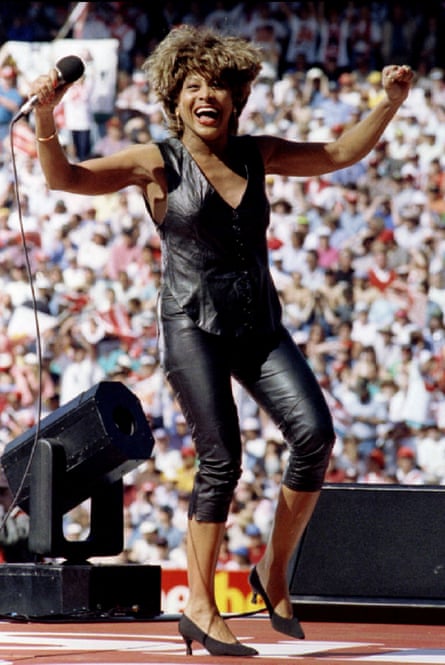It has been 28 years since Tina Turner featured in her final campaign as the soundtrack of rugby league, yet such is the reverence in which she is held in Australia, news of her death has cast a long and dark pall over the game.
The singer, who starred in the promotion of the Winfield Cup with her hits What You Get Is What You See and The Best from 1989 to 1995, died on Wednesday at her home in Switzerland aged 83. A testament to her immense and enduring popularity, the game has been overcome by sadness and nostalgia.
Since the mid-90s, there have been regular calls to bring Turner back to star in another campaign or headline another grand final. As recently as 2019, the NRL was in talks with her management about bringing back the singer and The Best. Jimmy Barnes performed the song for a long-running Fox NRL promotion.
No campaign – not Bon Jovi nor Chumbawamba nor Tom Jones, not the Hoodoo Gurus nor the poetry of Thomas Keneally nor Jessica Mauboy – ever came close to delivering the inspiration and the fanfare Turner managed.
Turner was arguably as loved in New South Wales and Queensland as she was anywhere else in the world, a remarkable state of affairs for a grandmother born in Nutbush, Tennessee, who had no idea what rugby league was before becoming its voice.
A global star who was regarded as one of the greatest performers at the peak of her fame in the late 1980s, Ken Arthurson and John Quayle pulled off one of the most unlikely coups in signing Turner to become the voice and face of the game. Attempting to change the image of the sport as barbaric and brutal, it was an attempt to woo female supporters, softening and glamorising the game’s stars, and making the game sexy.

The advertisements were an immediate hit. Rugby league was showcased in a stunning light, a marked change from the gruff and detached ads of years gone by that were devoid of creativity and ambition. Tina Turner was cool. Her songs were cool. Now rugby league was cool.
The world was a lot bigger in the late 1980s and attracting a global icon instilled in the game a true sense of worth.
Even the most optimistic of rugby league powerbrokers at the time, though, could not have envisaged the success the Turner campaigns would have – or the legacy they would create. Quayle, in particular, deserves most of the credit for getting Turner on board.
When it comes to critical demarcation points in the history of rugby league, Turner’s involvement is certainly one. The game in the late 1970s and early 1980s was a semi-professional one, a game known for its abject violence and amateur administration and blinkered worldview. Turner changed that and by the mid-1990s, rugby league had modernised. The game now had wide-reaching commercial appeal. Stars of the game carried themselves as such. Skill and speed were now prized as much as toughness and aggression. Crowds were up and significantly more diverse. Television wanted in.
after newsletter promotion
Rugby league went from being a game to a business and the impact Turner had on that cannot be understated.
Without her and the image-cleansing she provided, it is doubtful the tumult that engulfed the game in the 1990s would have hit as quickly or as hard as it did. Turner, in extraordinarily quick time, provided rugby league with wide-reaching appeal. This brought with it commercial opportunities that the administration of the time were ill-prepared to not only fully capitalise on but to fully understand that their world was changing.
Former Kiwi skipper Mark Graham once said rugby league was a professional game run by amateurs, and at no point in time was that more true than in the early 1990s. The fledgling pay television industry had arrived yet the ARL was giving away both a weekly game to the ABC and pay television rights for nothing to Kerry Packer. Players were seeing more money come into the game – even with that left on the table – and wanted their share as full-time professionalism came into view, yet the game seemed resentful of the notion. It all came to a head in the Super League war that was essentially the ramification of a business being badly run.
Full-time professionalism, pay television and the commercialisation of the gamewould, of course, one day have happened. Without Turner fast-forwarding it all though through her ad campaigns, it may have happened more organically and with more time for administrators to get a handle on the world they were in. Her impact on rugby league, perhaps unwitting, has been immense.
